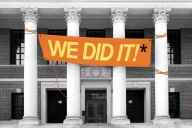You have /5 articles left.
Sign up for a free account or log in.
A number of higher education institutions have assigned Judge Denny Chin some reading for Tuesday.
Chin, the federal judge who is presiding over Author’s Guild et al. v. Google, Inc., has been inundated with letters and amicus briefs in advance of the September 7 deadline for participants in the class action to opt out of a settlement over the company's controversial Google Books project that has received preliminary approval from the court. A handful of the documents have come from professors, university libraries, and advocacy groups.
Most -- including the University of Wisconsin at Madison, Abilene Christian University, the Association of Independent California Colleges and Universities, the United States Distance Learning Association, and the United States Student Association -- have written in support of the settlement.
Others, such as the Association of College and Research Libraries and the faculty of the University of California System, have raised concerns about the proposed compromise, which would compel Google to establish the Book Rights Registry. The registry is conceived as an independent entity designed to ensure that publishers and authors are compensated for the use of their copyrighted work by charging libraries for subscriptions to its vast electronic database of out-of-print books.
Those who wrote in support of the settlement saw it as a way to make it easier for students and scholars to find and view hard-to-find texts that could be relevant to research.
“While interlibrary loan reduces the inequalities among libraries, there is a financial cost as well as a delay for scholars requesting the work, with no guarantee that an individual book will even be useful to their research,” Jeanine Varner, provost at Abilene Christian University, wrote in her amicus brief. “Thus, the settlement is a significant change for the better by creating a means for us to offer immediate electronic access to crucial published resources.”
Jonathan Brown, president of the California independent college group, found similar reasons to be enthusiastic about the settlement. “While librarians in academic and public libraries have worked hard to encourage the interchange of resources, the cost pressures facing educational institutions have limited the ability of these traditional solutions to increase content available for students and scholars,” he wrote to the judge.
In addition to providing a service to researchers, the Google Books project could be a boost for universities that lack the resources to field as deep-shelved a library as their more well-endowed peers, argued Gregory Cendana, president of the U.S. Student Association. “The settlement will reduce inequality among higher educational institutions,” Cendana wrote. “…The settlement provides adequate assurances that the subscription will be affordable, including by requiring that it be priced for ‘the realization of broad access.’ ”
The faculty of the University of California System also expressed concerns about the current cost of supplying students with what they need to do research effectively. However, professors there worried that the settlement might exacerbate that problem due to its dearth of safeguards against price gouging.
They argued that because Google and the Book Rights Registry will collaborate to determine how much libraries will pay for access to its millions of rare texts, and because one of the metrics will be the “pricing of similar products and services available from third parties,” it could easily rationalize charging rates equal to or greater than the “astronomical” rates charged by the publishers of academic journals.
The Association of College and Research Libraries voiced similar worries. “A university library spends an average total of $4.3 million a year for online journal subscriptions,” wrote Mary Ellen K. Davis, the association’s executive, in a brief also signed by the directors of the American Library Association and the Association of Research Libraries. “If journal subscriptions are ‘comparable’ to the institutional subscription, and a library pays $4.3 million for access to 31,000 journals, one can only imagine the price the registry might insist upon for a subscription to millions of books.”
This could have the exact opposite of the leveling effect optimistically predicted by the U.S. Student Association, Davis contended. “In the absence of the price discipline afforded by competition,” she wrote, “only those higher education institutions with the greatest resources would be able to afford an institutional subscription without dramatically cutting other library services.”
Ironically, the settlement could also hurt the movement toward open access that has prompted many professors to make their research freely available through university-based databases. "The agreement does not explicitly acknowledge that academic authors might want to make their books, particularly out-of-print books, freely available by dedicating their books to the public domain or making them available under a Creative Commons or other open access license," the brief continued.
While neither the California faculty nor the library associations opposed the settlement, both urged the court to require that Google build mechanisms that would allow university libraries to redress exorbitant pricing, protect user data, and guard against other perceived abuses that might result from its monopoly.
The deadline for copyright holders to opt out of the Google Books settlement -- and for interested parties to write the judge expressing support for or skepticism about the landmark project -- had been today, but it was extended until 10 a.m. Tuesday due to scheduled maintenance on the court’s electronic filing system.








